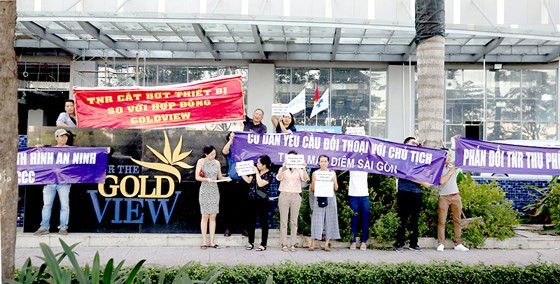
Reports from a workshop on intensifying apartment block management held by the ministry show that the country now has 108 apartment blocks where disputes have occurred between dwellers and investors, mostly in Hanoi and HCMC. These conflicts have been due to problems in apartment block management.
According to the ministry, regulations and sanctions for violations are unsuitable, insufficient and not strong enough to meet management demand and practical situation.
Some investors are unable to implement projects, have illegally transferred projects or broken regulations on construction, housing and fire prevention and fighting law. Some have just focused on profit and inappropriately paid attention to their obligations after selling apartments and not fully publicized information about projects.
Residents meantime have not sufficiently considered contents under negotiation in apartment sales contracts. Tenement disputes show problems in the state management role of relevant agencies and local authorities in some places, said the ministry.
Mr. Ha Quang Hụng, deputy head of the Housing and Real Estate Market Management Bureau under the Ministry of Construction, said that disputes, complaints and lawsuits in apartment buildings have been complex. The most noticeable issues are disputes in common and separate ownership, management boards of apartment buildings, maintenance expenses, service management fee and areas for community activities.
According to authorized agencies, some investors have refused to hand over maintenance fund to tenement management board. Vice versa, some groups of customers have managed to attend the board to seek profit from the maintenance fund.
In case of being unable attend the board, they have been found incite dwellers to cause disunity. Without mechanisms to solve conflicts, dwellers themselves have negatively struggled for their benefits such as marching in streets and sullying investors’ prestige. In respond, investors unilaterally cut off electricity and water supply raising difficulties for residents’ daily activities.
In order to solve the issue, investors have proposed the Ministry of Construction to soon review, amend and supplement legal documents related to apartment building management.
Many proposed the ministry to build technical standards for construction of apartment projects with clear regulations on the way to calculate areas of apartments, common and private ownership parts. Some proposed the ministry to no longer use the management model with major members being dwellers and investors’ representatives and establish tenement management and operation companies instead.
These companies will operate independently with investors and dwellers, authorized by the ministry to receive and handle information from investors and dwellers. Tenement management and operation maybe undertaken by investors under the close supervision by relevant agencies.
Meantime, HCMC Real Estate Association (HoREA) proposed the ministry to apply compulsory measures to force investors to transfer maintenance fund to tenement management boards and tightly stipulate responsibilities of investors in handing over apartments and land use right certificates to house buyers according to contracts.
Deputy minister Nguyen Van Sinh said that in the upcoming time, the ministry will urgently review and supplement legal documents to create a legal corridor to enhance tenement management, completely solve ongoing disputes and minimize new disputes and complaints.
The ministry will also review land use for tenement construction as well as abidance by construction licenses of apartment building projects. It is expected that the ministry will coordinate with the National Assembly’s Legal Committee to organize a mission to inspect the management, operation and use of apartment blocks in HCMC at the end of March with scrutiny in those with disputes.
























